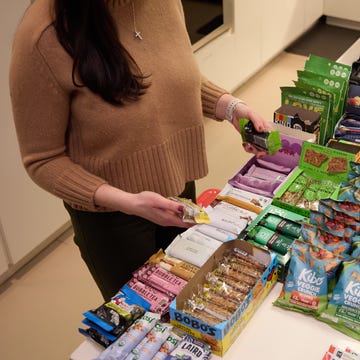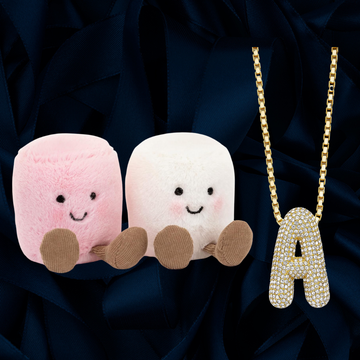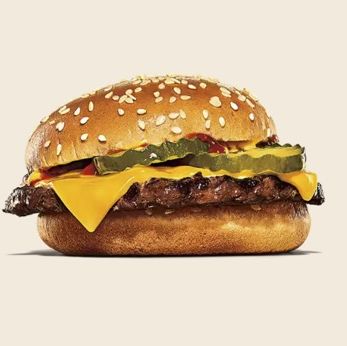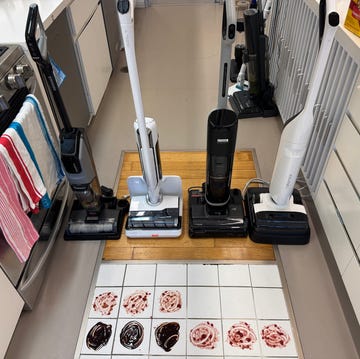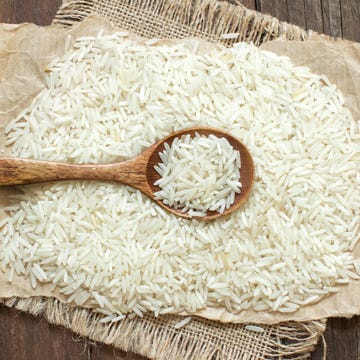10 Healthiest Energy Drinks, According to Nutritionists
Get the energy you need, without the junk. These low-sugar options are a healthier way to recharge.

We've been independently researching and testing products for over 120 years. If you buy through our links, we may earn a commission. Learn more about our review process.
The ultimate tools for improving energy levels in the long run are quality sleep, optimal hydration (with good old H2O) and a balanced diet. Energy drinks and caffeine won't provide true sustained energy, but they can be a convenient quick fix when needed.
According to the U.S. Food & Drug Administration (FDA), most people should limit their caffeine intake to no more than 400 milligrams per day, which is roughly equivalent to four or five cups of coffee. Yet some energy drinks exceed that in a single can, and many are also laden with artificial food colorings, additives and exorbitant amounts of added sugar. "For some people, consuming an energy drink can be a quick boost followed by a crash, so it would be good to understand what your baseline caffeine tolerance could be," advises New York-based registered dietitian Anita Mirchandani, M.S., R.D., C.D.N.
To help you make smart choices, the experts in the Good Housekeeping Institute Nutrition Lab have compiled a list of some of the better energy drink picks that prioritize natural sources of caffeine (as opposed to synthetic ones), contain minimal added sugar and steer clear of artificial food dyes. You can read more about how we evaluate energy drinks at the end of this guide, as well as insights on who should avoid energy drinks and caffeine altogether.
Pros
Free from artificial colors and preservatives
Zero sugar
Available in a variety of tropical flavors
Cons
Slight aftertaste from the stevia
Known for its stevia-based soda alternatives, Zevia has brought its sugar-free philosophy to a line of tasty energy drinks. This Non-GMO Project Verified pick has 0 grams of sugar and offers 120 milligrams of organic caffeine per can sourced from green tea leaves.
Each of the eight tropical flavors is refreshing, including standout options like Mango Ginger and Pineapple Paradise. The sweetness comes from organic stevia leaf extract, which may leave a slight aftertaste for some.
Free from artificial colors and preservatives, this health-conscious option is one of our top choices due to its minimal ingredients and moderate caffeine content, yet still enough to power you through that mid-afternoon slump.
RELATED: Green Tea Health Benefits and Myths
| Caffeine | 120 mg |
| Nutrition facts (1 can) | 0 calories, 0 g total fat, 0 mg sodium, 0 g total carbs, 0 g sugar, 0 g protein |
Pros
Fantastic flavor assortment
Zero sugar
Added vitamins and minerals
Cons
Contains sucralose
Created by Dwayne "The Rock" Johnson, this bold energy drink provides 160 milligrams of caffeine from natural sources, including green tea and coffee. Available in ten fun flavors, including staffer favorites like White Peach and Tropical Punch, it was among the best-tasting options we sampled.
Completely sugar-free and just 10 calories per can, it also packs in 250 milligrams of branched-chain amino acids (BCAAs) to support muscle recovery. Each can provides 100% of your daily vitamin C, and is an excellent source of B vitamins, including B6 and B12. Heads up: While it skips the sugar, it's sweetened with the sugar substitute sucralose, an artificial sweetener that is 600 times sweeter than table sugar.
| Caffeine | 160 mg |
| Nutrition facts (1 can) | 10 calories, 0 g total fat, 110 mg sodium, 2 g total carb, 0 g total sugars, 0 g added sugars, 0 g protein |
Pros
Convenient and compact solution
Great flavor variety
Rich in several essential electrolytes
Cons
Tablets take a few minutes to dissolve
These convenient dissolvable tablets deliver a powerful blend of organic green tea, ginseng, B vitamins and electrolytes to help you recharge fast. Just drop one tablet into 16 ounces of water, wait a few minutes for it to fully dissolve, and then sip — no shaker bottle required. Each container includes 10 tablets, making it easy to energize on the go.
With 80 milligrams of naturally sourced caffeine (close to the amount in about one cup of coffee), each tablet provides sustained energy. It comes in four great flavors, including Berry Blast, Ginger Lime Zing, Tropical Punch and Watermelon Burst, which are vibrant and refreshing.
RELATED: The Best Electrolyte Powders
| Caffeine | 80 mg |
| Nutrition facts (1 tablet) | 15 calories, 4 g total carb, 2 g total sugars, 2 g added sugars, 100 mg sodium |
Pros
Natural caffeine source
Zero calories
USDA Organic
Cons
Contains erythritol
Made with yerba mate — a naturally caffeinated tea derived from the leaves of the South American yerba mate tree — Clean Cause offers a sparkling energy boost with 160 milligrams of caffeine per can. Lightly sweetened with stevia leaf extract and erythritol, these drinks deliver bold flavor with virtually zero calories. But just a heads up that erythritol may cause digestive discomfort for some if consumed in large amounts.
Flavors include Cherry Lime, Watermelon and Orange Ginger, which are all bright and satisfying. Even better, every purchase has an impact: 50 percent of the net profits go towards funding alcohol and drug addiction recovery programs, making this a feel-good pick in more ways than one.
| Caffeine | 160 mg |
| Nutrition facts (1 can) | 0 calories, 5 mg sodium, 0 g total carbs, 0g total sugars, 0g protein |
Pros
USDA Organic
Incredibly tasty flavors
Low in added sugars
Cons
Expensive
This family-run brand was founded to share its Argentine heritage and wellness tradition with the U.S., and it delivers on both flavor and function. The yerba mate drink comes in three unique, refreshing flavors: Raspberry Bliss, Grapefruit Ginger and Berry Coconut Lavender. We recently taste-tested all three and were instantly hooked.
Each can of Ola Mate contains just 40 to 50 calories and 5 grams of added sugar, with the balanced sweetness coming from a hint of monk fruit and stevia. We were especially impressed with the fully organic ingredient list, which includes coconut water for natural hydration and ashwagandha, a type of Ayurvedic herb that research suggests may play a role in its potential to help ease anxiety and stress. The adorable packaging was a hit, too, just as thoughtfully designed as what's inside the can.
Pros
Large variety of flavors
No high fructose corn syrup or artificial colors
Portable powdered options available
Cons
Contains sucralose
Celsius has boomed in popularity over the past few years due to its low sugar content and 200 milligrams of caffeine, which is more than most energy drinks on the market. Each 12-ounce can contains zero added sugar but is sweetened with the artificial sweetener sucralose. It provides a boost of seven essential vitamins and minerals, including vitamin C and several B vitamins.
"My recommendation is to consume a max of one Celsius, and really, when you need a kick (and want to skip coffee). I do like the fact that there are several flavors and 10 calories and zero sugar," says Mirchandani.
In addition to over 15 different flavor options, it also comes in portable powder form that mixes with water for on-the-go energy. And if you prefer no bubbles, try the new Fizz Free option. Although the brand claims to help burn body fat, it should not be considered a miracle cure.
| Caffeine | 200 mg |
| Nutrition facts (1 can) | 10 calories, 10 mg sodium, 2g total carbohydrates, 0g sugar, 0g protein |
Pros
Natural caffeine source
Not too sweet
Nice selection of flavors
Cons
Contains sucralose
Each 12-ounce bottle of Uptime delivers 142 milligrams of natural caffeine and also features L-theanine, an amino acid that research suggests may enhance focus and mood when paired with caffeine (and provide a more sustained energy boost).
This sugar-free sparkling drink is sweetened with stevia instead of sugar, but it doesn’t come off too sweet. Although the option also contains sucralose, an artificial sweetener that is significantly sweeter than table sugar, it surprisingly offers a balanced taste and is available in seven different flavors, including Blueberry Pomegranate, Tropical Passionfruit and Sweet Summer Melon.
RELATED: The Best Time to Take L-Theanine
| Caffeine | 142 mg |
| Nutrition facts (1 can): | 5 calories, 0mg sodium, 2g total carbs, 0g total sugars, 0g protein |
Pros
No artificial sweeteners
Added vitamins and minerals
Low in calories
Cons
Available in only two flavors
Complete with a dose of energizing B vitamins, this refreshing pick delivers 100 milligrams of natural caffeine sourced from green tea. It's both certified gluten-free and vegan, and is also low in calories. Sweetened with a blend of organic agave nectar and organic stevia leaf extract, it skips sucralose entirely and lands on just the right level of sweetness.
While it's only available in two flavors (Melon Mate and Watermelon Mint), each can goes beyond hydration, offering 100% of the daily value for several essential nutrients, making it reminiscent of a multivitamin in a can.
| Caffeine | 100 mg |
| Nutrition facts (1 can) | 40 calories, 9 g total carbohydrates, 7 g total sugars, 7 g added sugars, 0 g protein |
Pros
Low in calories and sugar
USDA Organic
Rich source of vitamin C
Cons
Limited flavor options
This antioxidant-rich energy drink comes in at just 35 calories and 6 grams of sugar but packs in 140% of your daily vitamin C needs. We love the addition of açai berry and pomegranate, two antioxidant powerhouses, and the fact that it's USDA Organic certified.
Each can contains 120 milligrams of caffeine coming from green tea, yerba mate and guarana sources. One thing to note: the second ingredient is organic erythritol, a type of sugar alcohol that may contribute to digestive issues if consumed in large amounts. Additionally, the Açai Berry & Pomegranate is the only flavor on the low-calorie line; the brand offers other organic energy drinks, but they are higher in calories and sugar.
RELATED: Are Açai Berries Actually Healthy?
| Caffeine | 120 mg |
| Nutrition facts (1 can) | 35 calories, 0 g total fat, 5 mg sodium, 17 g total carb, 6 g total sugars, 6 g added sugars, 1 g protein |
Pros
Ideal for sweaty days and pre-workout sessions
Nice assortment of fruity flavors
Rich in vitamins, minerals and electrolytes
Cons
Contains sucralose
You'll get a potent 200-milligram dose of caffeine from green tea in each can of PHX, along with an impressive array of vitamins and minerals, all for just 10 calories. We especially appreciate that it contains zero grams of sugar and note that it delivers 100% of the Daily Value for vitamin C and several essential B vitamins.
Available in six flavors including Blueberry Lemonade and Watermelon Lime, staffers enjoyed the taste of this sugar-free beverage sweetened with sucralose. PHX is specifically formulated for hydration and features added electrolytes. However, with 350 milligrams of sodium per can (higher than most energy drinks), our dietitians say it's more of a hybrid between a sports drink and energy drink, making it best for sweaty days and pre-workout sessions.
| Caffeine | 200 mg |
| Nutrition Facts (1 can) | 10 calories, 0 g total fat, 350 mg sodium, 3 g total carb, 0 g total sugars, 0 g added sugars, 0 g protein |
How we evaluate energy drinks

Our registered dietitians reviewed over 30 energy drinks, carefully analyzing added sugar content, ingredient quality and caffeine sources.
We focused on picks with minimal added sugar and prioritized drinks that use natural sources of caffeine (like green tea and yerba mate) as opposed to synthetic caffeine. We also opted to only include choices with 200 milligrams of caffeine or less (roughly the amount in two cups of coffee), especially if you're also consuming other caffeinated foods or beverages throughout the day. Even with better-for-you ingredients, our experts advise sticking to no more than one can per day (and less if you're caffeine sensitive).
Ultimately, energy drinks can give you a quick jolt, but the effect is short-lived. For long-lasting energy, our nutrition experts recomend fueling your body with a balanced diet, staying hydrated and getting regular physical activity to naturally boost energy over time.
What to look for when choosing an energy drink

"My suggestion is a drink that would contain natural energy substances and perhaps with a base of coconut water plus one or more of these: green tea, yerba mate or coffee," Mirchandani says. Here are a few factors to consider when shopping for the best energy drink to match your needs and preferences:
✔️ Caffeine source and amount: You'll want to look at where the caffeine comes from and determine if its naturally derived (like green tea or yerba mate) or synthetic. Also, take note of the caffeine level per serving and check serving sizes, too, to make sure you're not getting more than you expect. Some cans contain more than one serving, so always read the label to avoid consuming more caffeine than intended.
✔️ Flavor variety: Energy drinks come in a wide range of flavors, and many brands offer variety packs. Our pros suggest sampling a few before committing to a case of a single flavor, to find what works best for your taste buds. Many of these energy drinks offer variety packs, so our pros suggest trying those first before committing to one case of a single flavor.
✔️ Sugar content: Most importantly, try to cap added sugar counts at 8 grams (the equivalent of 2 teaspoons of sugar) per can, and do not mix energy drinks with alcohol. If an energy drink is zero-sugar or sugar-free, consider what sugar substitutes the drink is utilizing for sweetness. Some may have an aftertaste or cause digestive issues if consumed in excess.
Who should avoid energy drinks?

According to the Centers for Disease Control (CDC) and the American Academy of Pediatrics, energy drinks are not recommended for children and adolescents and should be avoided by these individuals. Adults who are sensitive to caffeine should also steer clear of these beverages.
Since high doses of caffeine may exacerbate cardiac conditions, individuals with a history of heart disease should avoid energy drinks. Those who are pregnant and breastfeeding should limit energy drink usage as well. Lastly, Mirchandani adds that people taking antidepressants, blood thinners and/or anxiety medications should avoid these beverages.
What is the difference between natural and synthetic caffeine?

Chemically speaking, natural and synthetic versions of caffeine are almost identical. The natural variety is found in the leaves and seeds of many plants and shows up in coffee, tea and chocolate. Some energy drink brands add caffeine sourced from coffee, cacao beans or yerba mate leaves to their products.
Synthetic caffeine, on the other hand, is made in a lab or pharmaceutical plant and is often added to beverages like soda and energy drinks to enhance the stimulant effects. There is nothing wrong with either version of caffeine, but typically products with synthetic caffeine contain more additives and have a higher sugar content. "Synthetic caffeine is produced in a lab using chemicals (synthetic caffeine is man-made) and is often considered to be absorbed faster by the body, leading to a quicker energy spike and crash," Mirchandani explains.
Why trust Good Housekeeping?

As director of the Good Housekeeping Institute Nutrition Lab, registered dietitian Stefani Sassos handles all nutrition content, product testing and evaluation. She stays up-to-date on the latest research to provide evidence-based reporting on all things diet and nutrition, and she also runs large-scale tests and analyses for products ranging from protein bars to supplements.

Readers Also Read

The Ultimate List of the Best Jokes for Kids
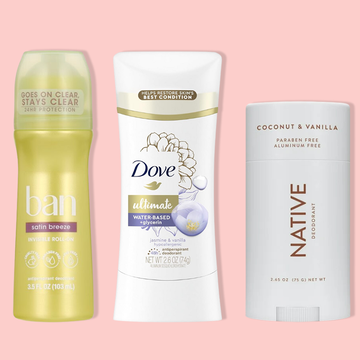
The Best Deodorants for Women

Mariska Hargitay Walks 2025 Emmys Red Carpet

The Healthiest Drinks (Besides Water) to Sip













